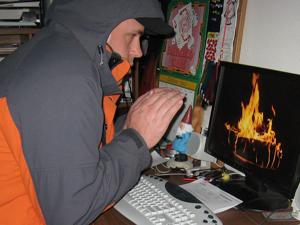What Cold Weather Does to Your Weight
By:
The average American gains five to seven pounds each winter. While there are countless ways to pack on the weight—fattier holiday foods, inclement weather reducing our willingness to go outside and exercise, busy holiday schedules—our gains aren't as uncontrollable as they seem to be.
RELATED: Why You Can't "Exercise Away" Obesity
Surprisingly, research shows that cold weather should actually cause us to lose weight rather than add on the pounds. Even better for the average holiday reveler, this information can give us an added tool to fight festive, winter weight gain.
Colder temperatures can help you burn more calories.
Uncomfortably cold weather can lead to increased weight loss by speeding up our metabolism as well as by bumping up the production of certain calorie burning hormones. How? When we're cold, our bodies sense that we need to warm up. The process starts with tiny sensors in the skin which fire off a message to your brain telling you that you're surface temperature is too low. This in turn gets relayed via the nervous system to muscles all over your body as instructions for the muscles to quickly expand and contract, doing what we call shivering.
Because shivering involves so many muscle groups—even your jaw muscles get in on the act, which is why your teeth "chatter" in the cold—it increases heat production. It also turns out that all of that contractile activity can increase your metabolic rate as much as five-fold, translating to weight loss.
A Japanese study published in 2014 bore out this data by holding participants in a 61-degree room for several hours a day in only a hospital gown. The result was that they lost about a pound in six weeks. Keep up this routine for a year and its possible that an individual could lose 15 pounds without going to the gym once, according to University of California researcher Ajay Chawla.
A separate report demonstrates the link between shivering, weight loss and hormone production, finding that apparently 15 minutes in the cold is the "metabolic equivalent of an hour of exercise," according to National Geographic. Published in the Journal of Cell Metabolism, the study contrasts calorie burn in subjects exercising in a 65-degree lab versus laying down on a bed at a chilly 53-degrees. The participants in the second test were instructed to stay in place until they started to shiver. The result? The shivering group produced the hormone irisin, which converts white fat cells that store fat into brown fat cells that burn fat. (Their muscle also released the hormone FGF21, too, which is responsible for increased calorie burn.)
Shiver for your health?
Not so fast. The problem with shivering is that it feels awful, so Dutch researchers looked into whether being mildly cold could also cause weight loss. Their findings may give you reason to smile.
"In most young and middle-aged people [non-shivering thermogenesis] increases by between a few percent and 30 percent in response to mild cold exposure," writes Dr. Wouter van Marken Lichtenbelt and his colleagues in the the journal Trends in Endocrinology and Metabolism. They define mild cold as 64 degrees, and suggest that temperature may be a way to "increase energy expenditure" when exercise is not an option.
"Indoor temperature in most buildings is regulated to minimize the percentage of people dissatisfied. By lack of exposure to a varied ambient temperature, whole populations may be prone to develop diseases like obesity," the study says.
So the next time you argue with co-workers over the setting of the office thermostat, send them this research. By turning down the temperature on your indoor surroundings, you may be able to save energy and lose weight. Or, you could just brave the winter weather for short periods without a jacket. It's your choice.
 Tumblr/typicalash - tumblr.com
Tumblr/typicalash - tumblr.com
